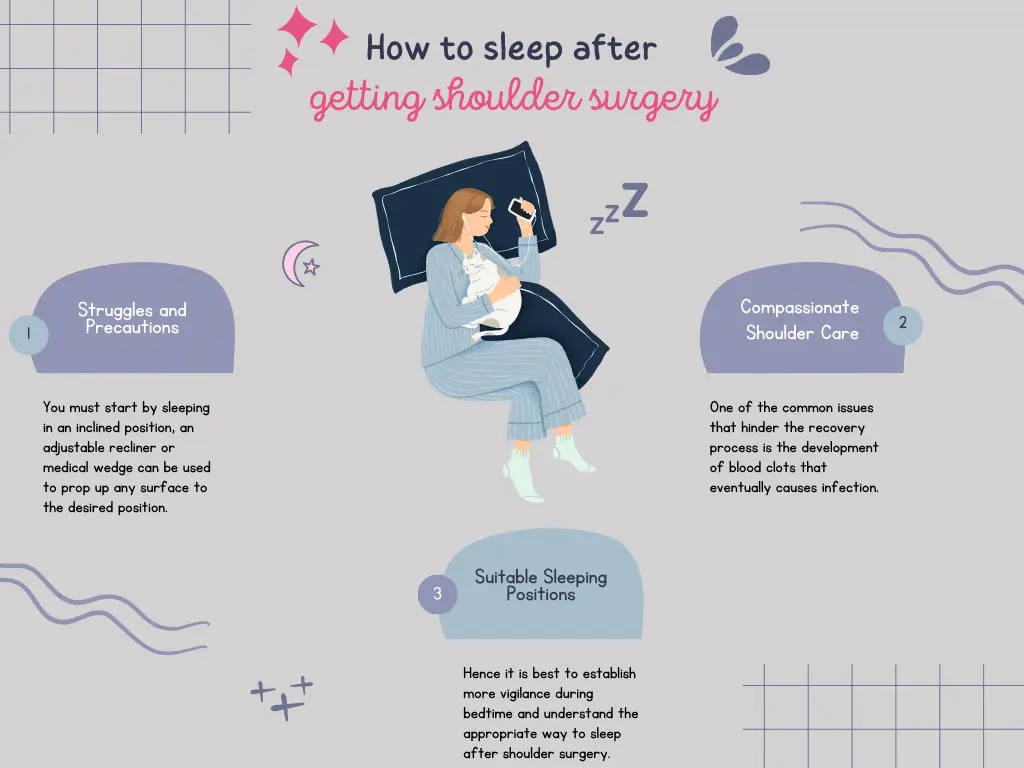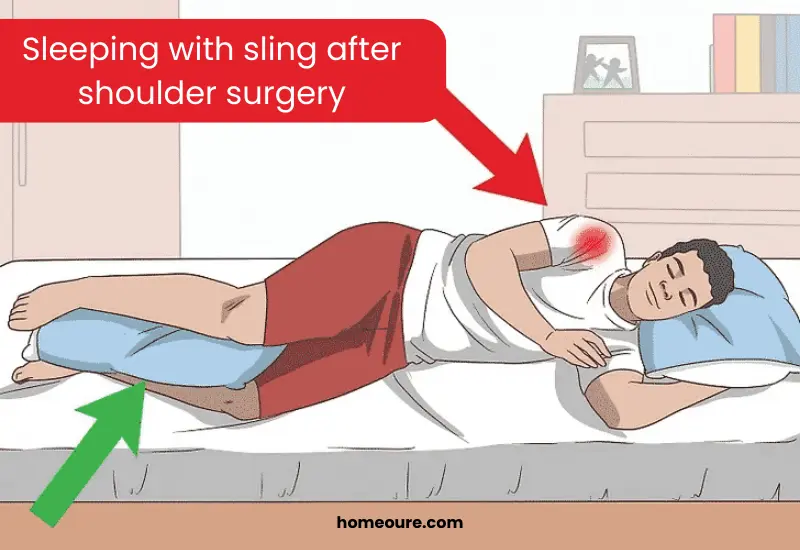Are you bothered by the palavers following your recent shoulder surgery? Are you not sure how to sleep after your surgery? Shoulder arthroscopy is a slightly invasive clinical procedure carried out by orthopedic surgeons to treat problems related to the rotator cuff, whereby the four primary muscles that connect the shoulder to the arm as tendons either experience severe slacking or tear or painful impingement.

The process can take up to one hour or less after which the patient is discharged as per their request on the same day. It is possible you may not feel the stinging pain of the surgery immediately due to the prevailing influence of neck blockers and anesthesia. Also have a look at best recliners for neck pain.
However, one must take careful precautions during their recovery, this includes sleeping properly after shoulder surgery. Let’s look at how to sleep after shoulder surgery!
Contents
- How to Sleep After Shoulder Surgery? – Comprehensive Guide
- Best position to sleep after shoulder surgery
- Wrapping Up Guide to Sleep After Shoulder Surgery
- Best Recliners For Dementia Patients
- Best Office Chairs For Tailbone Pain
- Can Power Recliners Be Operated Manually?
- Best Office Chairs for Degenerative Disc Disease
- Best Office Chairs for Pregnancy - Most Comfortable for Pregnant Woman
How to Sleep After Shoulder Surgery? – Comprehensive Guide

1. Struggles and Precautions
Whether it is a minor diagnosis or major treatment including complete shoulder cap replacement, patients need to take effective and prudent steps to ensure maximum healing and notable improvement.
One of the common issues that hinder the recovery process is the development of blood clots that eventually causes infection. Thus, medical professionals strongly advise patients to avoid sleeping flat on their back so as to avoid the build-up of weight on the healing shoulder.
A relatively peaceful sleep after surgery can be guaranteed through a few easy steps, taking medications according to your curfew and surrounding yourself with a mini pillow fort could be a few of the several. Also read about cushion and pillow difference to choose the right one.
2. Compassionate Shoulder Care
Though it is proven that you can proceed with your normal work routine 3-4 weeks after the surgery. Nevertheless, a thorough shoulder care regimen should be followed during sleep time to get rid of the post-day jitters that may have caused tension to gather up in the glenohumeral cap.
You must start by sleeping in an inclined position, an adjustable recliner for sleeping after surgery or medical wedge can be used to prop up any surface to the desired position. Along with many benefits of recliners, there are few disadvantages, you can read about dangers of sleeping in a recliner chair.
We are all familiar with the fast-working qualities of an arm sling and how it efficiently protects the arm during the daytime, this is true for nighttime as well to attain peaceful sleep after shoulder surgery. This secures the entire arm to the shoulder region and keeps it in a firm position to avoid shoulder tipping.
One more bedtime hack that people have found extremely effective is icing the shoulder or keeping a cool pack on the wound. The way to do this is to support it against a pillow and keep another pillow between the shoulder joint and torso. The ice pack can be removed after a while but the pillow promotes blood circulation and the formation of collagen which can act as an antioxidant to increase muscle mass.
You may also be interested to read about adapting a recliner after right arm surgery
3. Suitable Sleeping Positions for Shoulder Surgery
There is no doubt that healing requires intense care and comfort. One cannot only rely on medications to get better since it is a tedious process. Recovery is fastest at times when the patient is asleep as that is the time when oxygen in the blood repairs and regenerates cells to cure the wound and fight off bacteria.
Hence it is best to establish more vigilance during bedtime and understand the appropriate way to sleep after shoulder surgery. Below I have mentioned best way to sleep after shoulder surgery.
Also read a detailed answer guide about can sleeping in a recliner cause blood clots
Best position to sleep after shoulder surgery
To start off, you must be sure to always sleep on the side that has not undergone any medical procedure. Hence, owning a fetal position throughout the night works well.

Adding to that, it has been suggested that securing your pillow or body support under your arm and between two legs guarantees better sleep and increases the flow of nutrients to the injured tissues. It is common to develop numbness while you are in this position but to avoid that a periodic flexion and extension of limbs (except the wounded shoulder) is most beneficial.
If you have pressure sores, have a look at cushions for pressure sores on buttocks.
Frequently Asked Questions
What are the dos and don’ts after shoulder surgery?
Do not apply any stress to your arm through intense exercises such as lifting etc and consult your respective doctor before traveling.
Why is pain worse at night after shoulder surgery?
The shoulder is more vulnerable to pain during the night as it is compressed. As a result, there is a constant tug on the shoulder joints that causes inflammation.
How long should you sleep in a recliner after shoulder surgery?
It is best to sleep in a recliner for 1-2 weeks after which you can use a medical wedge to prop up your sleeping surface to a desired 45-degree angle. This inclined position should be maintained for 4-6 weeks.
If you have sciatica, you can also read my guide on how to sit on couch with sciatica.
Wrapping Up Guide to Sleep After Shoulder Surgery
Keeping in light all the precautions mentioned above it is also important to understand that a wound can only heal properly when it is given time. Rather than being impatient and hasty one must wait for the body to realign itself with the flow of nature.
Related Buying Guides

Hi. This is Terry Crews, a physician by profession and writer by passion. From the last 3 years, I deal with dozens of patients every month who have different type of issues due to incorrect sitting or sleeping positions. Whenever I recommended sitting or sleeping equipment to patient for pain relief, they found it difficult to choose the right product.
Keeping that in mind, I started Homeoure to share my knowledge and experience with readers to find the right equipment according to their needs.




